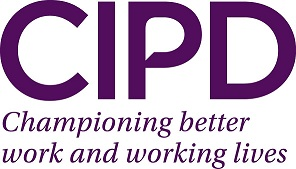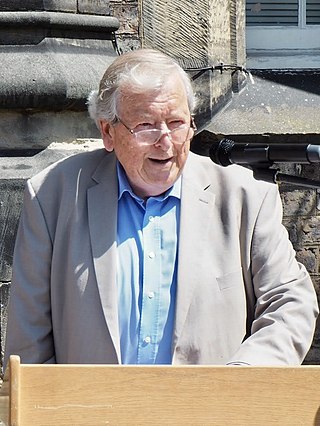
Philip Harding DL FSA is a British field archaeologist. He became a familiar face on the Channel 4 television series Time Team.
The Science Council is a UK organisation that was established by Royal Charter in 2003. The principal activity of The Science Council is the promotion of the advancement and dissemination of knowledge of and education in science pure and applied, for the public benefit. The Science Council is the Competent Authority with respect to the European Union directive 2005/36/EC. It is a membership organisation for learned and professional bodies across science and its applications and works with them to represent this sector to government and others. Together, the member organisations represent over 350,000 scientists. The Science Council provides a forum for discussion and exchange of views and works to foster collaboration between member organisations and the wider science, technology, engineering, mathematics and medical communities to enable inter-disciplinary contributions to science policy and the application of science.

The Institution of Engineers of Ireland or the IEI, is an engineering society primarily representing members based in Ireland. The institution is Ireland’s recognised organisation for accreditation of professional engineering qualifications under the Washington Accord, Sydney Accord, and Dublin Accord.

The Council for British Archaeology (CBA) is an educational charity established in 1944 in the UK. It works to involve people in archaeology and to promote the appreciation and care of the historic environment for the benefit of present and future generations. It achieves this by promoting research, conservation and education, and by widening access to archaeology through effective communication and participation.
In British archaeology a watching brief is a method of preserving archaeological remains by record in the face of development threat. An archaeologist is employed by the developer to monitor the excavation of foundation and service trenches, landscaping and any other intrusive work the developer undertakes to give the archaeologist sufficient time to identify and record any archaeological finds and features; however, the arrangement is rarely satisfactory for either party.
The Chartered Institute of Library and Information Professionals is a professional body for librarians, information specialists and knowledge managers in the United Kingdom.

The Chartered Institute of Environmental Health (CIEH) is a professional membership body concerned with environmental health and promoting standards in the training and education of environmental health professionals.
The Institute of Chartered Foresters (ICF) is the professional body for foresters and arboriculturists in the United Kingdom. Its royal charter was granted in 1982. The Institute grants chartered status to individuals following an examination process that includes a period of management or supervisory experience resulting in them being promoted to professional membership. Chartered members are recognised by the designations 'Chartered Arboriculturist' or 'Chartered Forester' and by the postnominals letters MICFor. Fellows of the institute bear the postnominals FICFor in addition to their designation.

The German Archaeological Institute is a research institute in the field of archaeology. The DAI is a "federal agency" under the Federal Foreign Office of Germany.

The Institute of Financial Accountants (IFA) is a professional accountancy body representing and providing certification for financial accountants in the United Kingdom. The IFA is a full member of the International Federation of Accountants.
Peter Hinton is a British archaeologist and the current Chief Executive of the Chartered Institute for Archaeologists. Before working for the IfA he worked for the Museum of London Archaeology Service originally as a volunteer field archaeologist and eventually specialising as a post excavation manager. He started working for the IfA in 1997 after being actively involved since 1987. He was elected a Fellow of the Society of Antiquaries on 10 October 2003, he is also a Fellow of the Society of Antiquaries of Scotland.

The Pakistan Institute of Public Finance Accountants (PIPFA) is an autonomous body recognized mainly in the government sector and established under license from the Securities and Exchange Commission of Pakistan by the authority given under section 42 of the Companies Ordinance, 1984.

The Chartered Institute of Personnel and Development (CIPD) is an association for human resource management professionals. Its headquarters are in Wimbledon, London, England. The organisation was founded in 1913—it is the world's oldest association in its field and has over 160,000 members internationally working across private, public and voluntary sectors. Peter Cheese was announced in June 2012 as CIPD's new CEO from July 2012.

The Federation of Archaeological Managers and Employers (FAME) is a professional archaeological body in the United Kingdom.
The Deutsche Gesellschaft für Ur- und Frühgeschichte e.V. (DGUF) – the German Society for Pre- and Protohistory – has more than 700 members and is thus the largest German association active in the field of prehistory and the early historical period. Its members are not only archaeology professionals but also private citizens interested in the subject. Known informally by its acronym, DGUF, it is the only nationwide archaeological association that also allows individual personal membership.

Peter Vincent Addyman,, known as P. V. Addyman, is a British archaeologist who was Director of the York Archaeological Trust from 1972 to 2002. Addyman obtained a degree in archaeology at Cambridge University, after which he lectured at Queen's University Belfast and the University of Southampton, while also conducting excavations. In 1972 he was offered the directorship of the newly founded York Archaeological Trust, the creation of which he had proposed; along with excavation work in York, he oversaw the development of the Jorvik Viking Centre, the Archaeological Resource Centre, and Barley Hall. In 2000 he was appointed a Commander of the Order of the British Empire.

DigVentures is a social enterprise organising crowdfunded archaeological excavation experiences. It is registered with the Chartered Institute for Archaeologists (CIfA), and is a CIfA Accredited Field School.
The Institute of Historic Building Conservation (IHBC) is a professional body in the United Kingdom which was formed as a charitable trust company in 1997 by members of the former Association of Conservation Officers. The object was to widen the scope of the profession from those mainly concerned with the statutory regulation of the historic environment to all those who practice professionally in historic and built environment conservation.
The Register of Professional Archaeologists (RPA) is a professional organization of archaeologists headquartered in Baltimore, MD. Members of the RPA agree to follow a standard code of research ethics and conduct and must be formally approved for membership by a panel of elected colleagues. Similar to organizations elsewhere, such as the Chartered Institute for Archaeologists or Australian Association of Consulting Archaeologists, the Register is a mechanism for enforcing archaeological standards, particularly among the large numbers working in cultural resources management.
Matthias Untermann is a German art historian and medieval archaeologist.











